A pill made of cinnamon, cranberry and ‘healthy’ bacteria is being tested as a way to prevent and treat cystitis.
This common infection, which affects up to half of all women at some time, occurs when bacteria that live harmlessly in the bowel or on the skin get into the bladder through the urethra, the tube that carries urine out of the body.
Researchers believe the combination of active ingredients will work together to prevent E. coli and other bacteria responsible for the infection sticking to the walls of the urinary tract.
The theory is that the pill hones in on P-fimbriae, small protrusions found on the surface of each bacteria cell that help it anchor to the walls of the urinary tract. The scientists behind the polypill say that cranberry affects the formation of these protrusions — the bacteria instead become lengthened and deformed, making it harder for them to take hold.
Trans-cinnamaldehyde (an ingredient in cinnamon oil) and compounds in cranberry have also been shown in previous scientific research, including a 2011 study in the Journal of Urology, to stop bacteria anchoring themselves on the host tissue and invading bladder cells.
Researchers believe the combination of active ingredients will work together to prevent E. coli and other bacteria responsible for the infection sticking to the walls of the urinary tract [File photo]
The healthy bacteria in the polypill are thought to bolster immune cells in the bladder wall.
Between 50 and 60 per cent of women suffer from a urinary infection such as cystitis at some time in their lives, according to a study published in Therapeutic Advances in Urology last year.
Women are most at risk because they have a shorter urethra than men, making it easier for bacteria to reach the bladder. It can also become a more frequent and recurrent problem for women who’ve gone through the menopause as falling oestrogen levels cause tissues to thin, making it easier for bacteria to take hold.
Symptoms include burning or stinging during urination; an urgent need to urinate; and dark, cloudy or strong-smelling urine. It can also make those affected feel generally unwell, achy, sick and tired.
Treatments include painkillers and antibiotics. But finding the most appropriate and effective antibiotic for a patient can take time, and requires samples being tested in a lab. The drugs can also have side-effects, such as diarrhoea and nausea.
There is also the growing problem of antibiotic resistance, where bacteria find ways to overcome the drugs designed to kill them. The National Institute for Health and Care Excellence revealed, in 2017, that 34 per cent of one million NHS urinary tract infection samples were resistant to the antibiotic trimethoprim.

The pill made of cinnamon, cranberry (pictured) and ‘healthy’ bacteria is being tested as a way to prevent and treat cystitis
The new treatment is being trialled at the Alfred Fournier Institute in Paris on 80 women, aged 18 to 65, who have had at least two episodes of cystitis during the last six months, and whose quality of life has been significantly reduced as a result.
They will be given two pills a day and compared against a control group of similar women who will not have had the pill. Researchers will compare the number of cystitis infections and symptoms in the two groups over six months. The results are expected next year.
Professor Raj Persad, a consultant urologist at Bristol Urology Associates, believes the new pill shows promise.
He says one hypothesis about recurrent cystitis is ‘that some bacteria cling on to the inside of the bladder wall and if not treated thoroughly enough can re-infect’.
‘This new therapy proposes to loosen the hold bacteria have on the bladder wall,’ he adds.
A type of bacteria found in the vagina may prevent recurrent cystitis.
In a new study, vaginal suppositories containing Lactobacillus crispatus used two to three times a week over one year helped prevent attacks, reports the International Journal of Urology.
The treatment not only stopped attacks during the 12 months, but was also protective over the following year. Lactobacillus crispatus out-muscles bad bacteria and stops them taking hold, suggest the researchers.
Lockdown legacy
The lasting impact of pandemic shutdown. This week: Worsening tinnitus
Tinnitus, which causes ringing or other noises in the ear without an obvious cause, has worsened for almost half of sufferers because of lockdown, research found.
In a study of 3,000 patients, published last November in Frontiers in Public Health, 40 per cent had worse symptoms during lockdown.
‘Those who found the lockdown or pandemic stressful or for whom it exacerbated financial or health worries were most likely to find their tinnitus worsened,’ says Dr Eldre Beukes, a lecturer in audiology at Anglia Ruskin University, who led the study. ‘Tinnitus and emotional distress can trigger or worsen each other.’
She suggests cognitive behavioural therapy (talking therapy) and mindfulness may also be worth discussing with a professional. Online groups for tinnitus sufferers can also help counteract the isolation.
Do this
Look on the bright side — in a new 12-year study, researchers found that the odds of developing cognitive impairment, such as dementia, were lower in those who reported better psychological well-being (which included being optimistic and having social support), according to the Journal of Aging and Health.
Get a grip
The conditions linked to the strength in your hand. This week: Covid-19
Poor grip strength might predict how someone is going to react to catching Covid-19, with the chance of serious infection three times higher in people with a weak grasp, according to a study published in the journal Heart & Lung in June.
A separate study found grip strength also correlates with the risk of hospitalisation from Covid-19 in the over-50s, reports the Journal of Cachexia, Sarcopenia and Muscle.
‘Grip strength is a vital sign and as important as blood pressure, body temperature, pulse and breathing rate,’ explains Professor Murat Kara, a specialist in physical rehabilitation at Hacettepe University Medical School in Ankara, Turkey, who worked on the first study.
‘Generally, strong grip strength correlates to longevity. Low grip strength indicates the person is frailer and, therefore, more prone to complications — and even premature death — with any infection.’

Poor grip strength might predict how someone is going to react to catching Covid-19, with the chance of serious infection three times higher in people with a weak grasp
